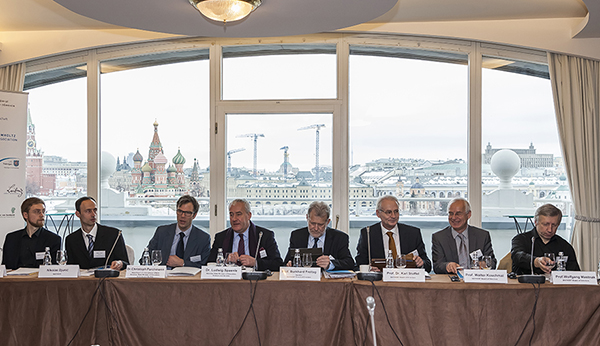Russian-Bavarian Cooperation in Higher Education and Science
Experience of the Bavarian Academic Center for Central, Eastern and Southeastern Europe (BAYHOST)


Nikolas Djukić, BAYHOST
Partnership
At present, Bavarian and Russian institutes of higher education maintain 138 education partnerships. Though the majority is located in Moscow and St. Petersburg, there are Russian universities cooperating with Bavaria throughout the whole country, from Kaliningrad to the Far Eastern Khabarovsk. While some Bavarian universities have been cooperating with Russian partners successfully for many years, others are just establishing first academic contacts to Russia.
The partnership agreements offer most of all the possibility of exchanging students. Furthermore, there are six double degree programs of Russian and Bavarian institutes of higher education in different subjects ranging from linguistics and law to computer science. Some more double degrees are planned, but up to now only few students use this opportunity. The Russian side is very interested in establishing more international double degrees. A lot of coordinative work has to be done by the partner institutions until a double degree is ready to start. Difficulties are sometimes hidden in administrative and legal details.
Research cooperation
Of course, there is also various research cooperation between Russia and Bavaria that has not been completely documented. It is present in all academic directions like Russian philology, law, economic sciences, physics, computer science, and mechanical engineering. Cooperation is dedicated both to basic research and to applied issues. There is a big variety in the forms of cooperation: for example, trips of individual researchers in both directions, short-term projects involving a group of researchers and students; projects lasting several years that are financed by the German Research Foundation (DFG) and the Russian Foundation for Basic Research (RFBR), and even the establishment of a laboratory in Russia financed by a Russian mega-grant.
In spite of the big variety of topics and forms of cooperation, the full potential for joint research has not been used by far. The existing cooperation is based on projects of individual researchers on both sides with complementary expertise who make efforts and succeed in attracting funds. However, in many fields the research landscape is so different that successful joint research is not possible without further preparation.

Prof. Dr. Dr. habil. Godehard Ruppert (Spokesman of the BAYHOST board of directors), Prof. Dr. Sergey Y. Mikadze (Vice-Rector of Saint Petersburg State University of Economics UNECON), Prof. Dr. Dirk Holtbrügge (Chair of International Management, Friedrich-Alexander-Universität Erlangen-Nürnberg FAU), Prof. Dr. Günter Leugering (Vice-President for International Affairs at the Friedrich-Alexander-Universität Erlangen-Nürnberg FAU), Andrey Matvienko (Deputy Consul General of the Russian Federation in Munich) Photo: Giulia Iannicelli
Joint events
This became obvious at the Bavarian-Russian conference on economics and business administration in November 2017 at Friedrich-Alexander-Universität Erlangen-Nürnberg (FAU) that attracted about 180 participants from Bavaria and Russia. Many new contacts were established. The program showed a broad range of topics in economics and business administration that are investigated in Russia and Bavaria. Not all of the Russian participants found the corresponding counterpart in Bavaria. For example, in Russia international cooperation in higher education and science is subject to research itself, hardly in Bavaria.
An enhanced exchange of young academics in order to train them in working methods, management of research projects and applying for funds can contribute to overcoming existing barriers. Through its annual scholarship program, BAYHOST supports PhD studies and long-term research sojourns of Russian graduates in Bavaria giving them the possibility to become familiar with the German science system. The Mobility Grants funding program facilitates short-term research sojourns.
In the years of 2016 and 2017 BAYHOST participated in delegation visits of the Bavarian Prime Minister and the Bavarian State Minister for Education, Science and the Arts to Russia in order to create favorable conditions for a more intensive academic cooperation. In March 2016 the Bavarian State Minister for Education, Science and the Arts chaired a round table on Bavarian-Russian cooperation in higher education and science in Moscow, where leading representatives of Russian and German institutes of higher education and research, university associations and foundations took part. Thanks to these delegation visits, BAYHOST was introduced to Russian academic organizations and many universities. Despite contacts to academic organizations and university associations, direct communication with universities and even researchers still remains highly important for initiating academic cooperation and leads to concrete results more effectively.
Prospects
When we have a look at the partnerships of Bavarian universities with Russian ones, we clearly see that apart from Moscow and Saint Petersburg there are further important centers of higher education and science in Russia. Among the partners are universities in Kazan, Yekaterinburg, Novosibirsk, and Tomsk.

Opening of the Round Table on Bavarian-Russian cooperation in higher education and sciences by Bavarian State Minister Dr. Ludwig Spaenle in March 2016 Photo: DWIH
Presently, many Russian universities are very open to international cooperation. BAYHOST regularly receives proposals for cooperation. Sometimes, the information included in these proposals is rather general, while Bavarian universities prefer suggestions to be as concrete as possible in order to make a decision. In this case, a better coordination between the members of the university leadership and the international office and the teachers and researchers would be desirable in order to identify common fields of interest and to fill new partnerships with life. Otherwise, they might just exist on the paper.
Based on the priorities of Bavarian and Russian universities, BAYHOST will keep working on intensifying academic relations. Establishing contacts with a large number of universities was the first step, while for the future BAYHOST plans smaller and more specific conferences and workshops that should lead to joint projects and grant applications.